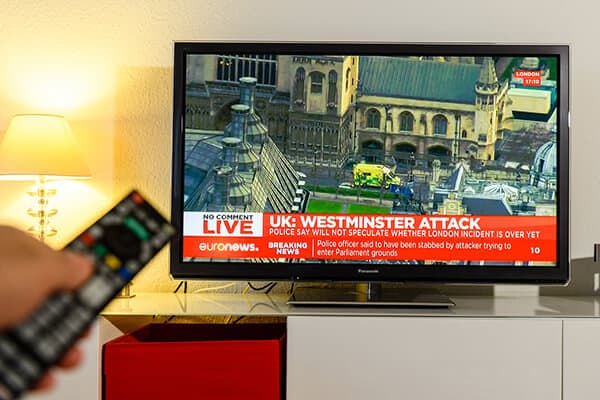First responders see trauma day-in and day-out.
Doctors and nurses haunted by those you help, or cannot help any longer.
Global warming. Eco-anxiety. Racism. Terrorism. Life-threatening viruses.
It’s as if the news is there to constantly remind us all that the world we live in is a dangerous place.

What you see on the news and what you see at work can be invasive. At minimum, it all feeds into how you view your own sense of safety and security. If you feel threatened and unable to escape, this can feed into your self-belief. Then, you may feel helpless, and even hopeless. If you don’t have hope, then you may not see any point in getting help. This may be what stops you from asking for help or support from a friend or professional.
Helping professionals can easily be consumed by the pessimism that comes with the job. The sheer enormity of the issues you see in the world. It’s exhausting. Overwhelming. So much so that you begin to doubt there is any good in the world. You stop living life to the fullest because you don’t see a point. Then, you stop tending to your own mental health, physical health, and spiritual well-being.
First Responders Who Carry the Weight of the World Every Moment of Every Day Will Suffer From Burnout
It’s not selfish to want a break. In fact, it’s good self-care to recognise the need for a change. Perhaps you find yourself wanting to:
- stop carrying the stress you experience from work into your home
- find a way to be less affected by or shut off what you see on the news and in social media
- stop the thoughts about bad things happening to you
- be less negative and more positive
- have the energy and motivation for life that others around you have
- be at peace with things you can’t control
What is Learned Helplessness?

When a person or animal is subject to pain or adverse stimuli for a prolonged period of time without means to escape, they will eventually stop looking for a way out. This is commonly known in psychology as learned helplessness. As first responders and helping professionals, you’re surrounded by ongoing work with trauma and listening to the worst of the news. This becomes your learned environment, which can shape the way you perceive the world and yourself.
Often, we see this most acutely as someone who has grown up in a house where they experienced abuse and neglect. As understood from their learned environment, they apply what they know when outside of the family home. Believing that the world is also no good. Too dangerous. And, people can’t be trusted.
Being more aware that this psychological phenomenon is taking place and making active choices to NOT stay in this state of learned helplessness is key to psychological wellbeing.
How Does Learned Helplessness Happen to Helping Professionals in Stress?
Unfortunately, helping professionals dealing with pain and trauma on a daily basis can be affected by learned helplessness too. Let’s break this down into three primary reasons, with some ways to combat this problem.
1. This is a trauma response.
Your brain and body are responding to the large amount of ongoing trauma that you’re taking in on a daily basis. Witnessing and experiencing vicarious trauma at your job and what you see and hear about what’s happening in the world. It just makes sense. When you are overwhelmed with stories and cases with a traumatic ending or loss, the secondary trauma will feed into your own view of the world. These issues will further fuel fear and self-doubt, even when witnessing something that couldn’t be helped or someone who couldn’t be saved.
Tips for protecting against an uncontrolled trauma response:
It’s important to safeguard yourself and put boundaries around you!
- Have open and ongoing conversations with your friends, loved ones and colleagues about how you are really doing.
- Minimise the news you consume and the social media you read.
- Find a way of keeping work at work so that you don’t carry it back home.
- For example, maybe you can develop a “ritual” of changing clothes at the office or when on the ward, taking a shower before leaving the hospital, or even having a specific pair of shoes you only wear during work time. This physical manifestation of “cleansing”, “changing” or “switching off” can signal to your brain that it is time to switch gears to personal life now.
2. Learned helplessness can make you less aware and able to do your job.
If you show up to work always stressed or depressed, feeling hopeless, believing that you can’t actually help someone – then you’re not performing at your best. Potentially, adding to the hopelessness that your patients feel. This means it would be hard for you to really help anybody.
Tips for keeping yourself mindful and present in your daily work:
We can all work too hard because we love what we do. However, these tips might help keep yourself strong and able to sustain these trying times.
- Build a support network with your manager and colleagues with additional check-ins and supervision.
- Vary your workload and tasks as much as possible.
- Take sufficient breaks during your day(s) and nights.
- Use your annual leave so you get holiday time away from work.
3. Finally, learned helplessness can negatively affect your mental health.
This problem can make you isolate yourself and become harder to reach. What you see happening in your immediate environment can affect how you feel. You might start believing there’s no point in getting help, internalising the helplessness that comes with what you see and hear on an ongoing basis. This mindset can be invisible and go undetected for a long time, especially if you truly believe you cannot be helped. Sometimes, we minimise what we’re going through because our day-to-day reality is so intense. Know that everyone deserves help and support. Helpers need help too.
Tips for improving your self-care as a helping professional:
Self-care and prioritising your well-being needs to be a part of prevention and ongoing care. So, be sure to do things to enjoy life!
- No matter your passion – food, music, creativity, relaxation – engage in activities where you feel you have a sense of control and independence.
- Focus on creating a good support network.
- Consider finding a therapist who understands what you’re going through and is equipped to help create a healing space just for you.
As a helping professional you see a lot. You may not be able to stop all the bad things from happening in the world, but you can learn to understand what stops you from getting the help you deserve. You’re not alone! Let’s build a stronger belief in hope, together.

Begin Therapy for First Responders and Helping Professionals in London
First responders and helping professionals need someone who understands. Someone who is able to both help and support from a place of empathy. That’s where I come in. One of my counseling specialties is dramatherapy for first responders. You may be doubting your role. Or, wondering how you fit into the bigger picture when bad things keep happening in our world. Perhaps, you recognise the way your job is affecting your family. Maybe you just don’t think therapy can work for you. Whatever your reasons for reading this are, if you’re a first responder, I can help you.
You do not have to manage vicarious trauma and triggers all on your own.
When you are ready to take control of your life, I am ready to help you. You deserve healing from your PTSD symptoms, hope about the future and to have healthy relationships moving forward. I am a trauma counsellor with therapy offices in Angel and Farringdon. I would love to help you find healing through trauma counselling. If you are ready to let go of your stress, manage your daily anxieties, and feel more connected with your loved ones, I can help.
Let’s get started with a free 20-minute therapy consultation over the phone. I look forward to speaking with you very soon!
________________________________________
If you have any requests for a blog post, please feel free to send your questions, comments or ideas to: jamie@ytherapy.com
Please note that this blog is meant to be educational and should not be a substitute for therapy.
If you would like to enquire about trauma therapy, please contact me or book an appointment: https://ytherapy.com/book-an-appointment/

